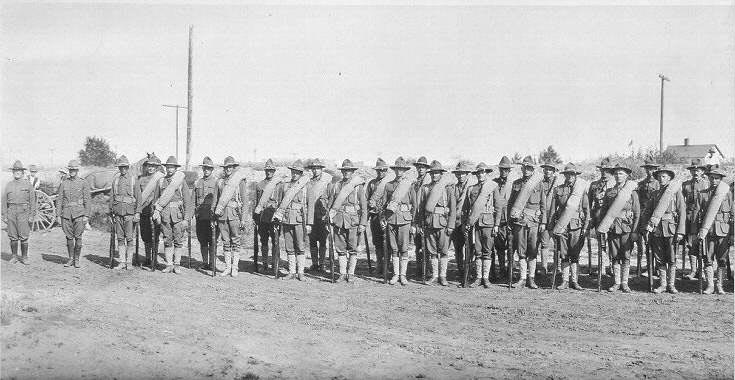
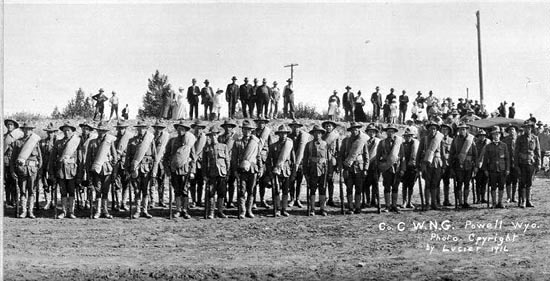
Company C, Wyoming National Guard entraining for Fort D. A. Russell preparatory for
service along the Mexican Border, June 1916. Photo by A. G. Lucier.
At the time of the above photo, the United States was determined to remain neutral in the Great War being fought in Europe, as
perhaps exemplified by the Irving Berlin popular hit, "Let's All Be Americans Now," a portion of the rfrain:
England or France may have your sympathy
Or Germany
But you'll agree that now is the time
To fall in line
You swore that you would so be true to your vow
Let's all be Americans now.
Nevertheless, the winds of war were blowing from the south with the inabiity of the Mexican government to
control its borders. On March 9, 1916, Pancho Villa invaded the small New Mexico town of Columbus south of Deming.
Seventeen Americans were left dead in the smoldering ruins of the town.
The Tribune in its June 23, 1916 front page story of the mobilization of Company c by
President Wilson wrote:
It is admitted that President Wilson has gone the limit of forbearance toward our
misguided neighbors to the south. The limit was reached when American life became
unsafe along the borders of Texas, Arizona and New Mexico and when Carranza, the de facto president of Nexico refused to
permit Americans forces to do the policing of the borders of Mexico which that country was unable or unwilling to do."
After mobilization and prior to being shipped out to Fort D. A. Russell, Company C bivouaced on the vacant lots south of the Pratt-Mann store. From
D. A. Russell, the unit was transferred to Camp Cody, Deming, New Mexico. Ultimately, some 50,000 troops were stationed along the
border including 30,000 from throughout the west at Camp Cody.
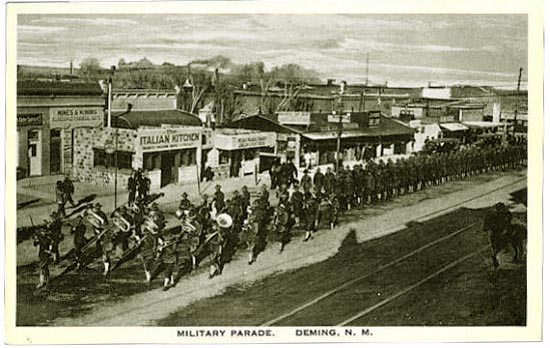
Deming, New Mexico, Miltary Parade, 1916.
While at Deming, Bill Sawtell was promoted to from Liuetenant to Captain.
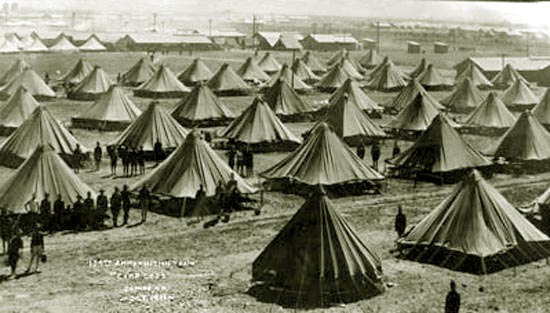
Camp Cody, 1916.
Camp Cody was also a major training camp during World War I which would ensue in only a few short months.
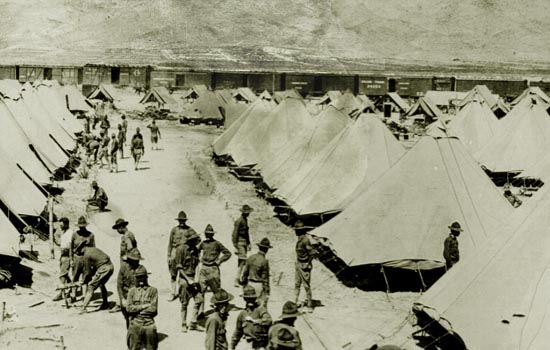
Camp Cody, 1917.
In March 1917 Company C was demobilized and returned to Ft. D. A. Russell and thence to Powell. There, the boys from Powell were welcomed home and
treated to dinner at Longley's Cafe. Demobilization of Company C would not remain long.
In 1916, the German Imperial High Seas fleet attempted to break the British blockade, and lure the Royal Navy into a trap and destroy it. Thus,
Germany hoped it would be able to resume overseas commerce. The attempt failed at the Battle of Jutland. Contributing to the failure was that unknown to the
Germans, the British had broken the German naval code. The German fleet remained bottled up for the rest of the War.
In 1917, and indeed since the 1870's, the center of the world's transoceanic telegraphic communications passed through a telegraphic station
owned by The Eastern and Associated Telegraph Companies at Porthcurno, a small isolated
Cornish village southeast of Land's End. Today a large portion of the telegraph station is
below ground in an underground bunker, but has been converted to a museum. A part of the process of
relaying telegraphic messages was through the use of an early equivalent of an ink jet printer
in which the dots and dashes are printed out. Thus, the British had a record of all
international telegraphic communications. With the beginning of Great War, all telegraphic
communication by Germany through German owned cables running down the English Channel to the outside world were cut.
Germany could communicate only
through the use of wireless which was unreliable and subject to interception or through the use of coded and encrypted cables from \
neutral country's diplomatic cables passing through Britain itself. President Wilson had hopes that
he could negotiate a peaceful settlement of the War. Thus the Germans were able to prevail upon the
United States to all it to use American diplomatic cables for its communication. All telegraphic messages were to
originate in the American Embassy in Berlin and from there to the German Embassy in Washington. The Americans had
one proviso, the messages were to be in the clear. Nevertheless in spite of the proviso, the German Foreign
Ministry prevailed upon the American Ambassador to allow it to send an encryped telegram to its
Embassy in Washington. The German system of encryption relied upon coding which itself was encrypted using a numbered system and
a key.
Unbeknownst to the Germans, the British Admiralty's "Room 40" using a variety of methods and luck ranging in location from
the Gulf of Finland, Australia, Mesopotamia, and the "Miraculous draft of fishes," had broken the German codes and encryptions.
Like the "Ulta Secret" of World War II, the breaking
of German codes could not be revealed or even suggested. Any information used from the
German Codes had to have a backup story suggesting that the British just had good luck. During World War II,
the Home Fleet's interception of the Bismark was covered by its "accidental" finding by a Catalina Flying Boat.
The very existence of Room
40 was a secret known only to Admiral Jackie Fisher, Winston Churchill, and a very few others. In January, 1917,
Room 40 decrypted a telegram from the German Foreign Minister Arthur Zimmerman to the German Ambassador in Mexico City which
dragged the United States into World War I. In the telegram, Zimmerman proposed that in the event of war between the
United States and Germany, that Mexico become allied with Germany. In exchange, the Germans would see that Texas,
New Mexico and Arizone would be returned to Mexico. Release of a copy of the decrypted telegram would reveal tht the
Geerman codes had been broken. Since the British surmised that the telegram had been forwarded by the
Washington embassy to Mexico City, the British arranged through its ambassador in Mexico by means of
bribery and burglary to steal a copy of telegram that had been decoded by the Germans in their embassy. By this means,
the British did not have to reveal that they already had a copy which they had decoded. On March 1, 1917, His Majesty's Government
delievered a copy of the telegram to the United States. On March 3rd, German Foreign Minister Zimmerman conceded that the
telegram was authentic. Adding insult to the injury was the fact that the Germans transmitted the telegram using American
State Department diplomatic cable facilities. On April 2, President Wilson asked for a declaration of war on Germany. The Mexican
government recognized that Germany had no way of providing equipment or assistance to Mexico, rejected the German
overture.
On April 6 the 2nd Battalion of the Wyoming National Guard was mobilized. In Powell, Capt. Sawtell was made company commander and
First Sargeant Gordon House was promoted to Second Lieutenant and authorized to bring compnay strenght up to hundred. Lt. House opened a
recruiting station in Stienbarger's pool hall. The irrigation district announced that additional areas would be opened to leasing.
In July Company C was mobilized. Termporary housing was in the school gymnasium. Mess was taken at the Powell Hotel. Gordon House was promoted to
1st Lt. And by the same token Company "A" in Newcastle, Company "B" from Lander, Company "D" from Sheridan, were mobilized. Other Companies of the
Third Wyoming Infantry were assigned to the 116th Ammuniciton Train.
In August from Powell, the boys were shipped to Ft. D. A. Russell, for physicals, innoculations and further training.
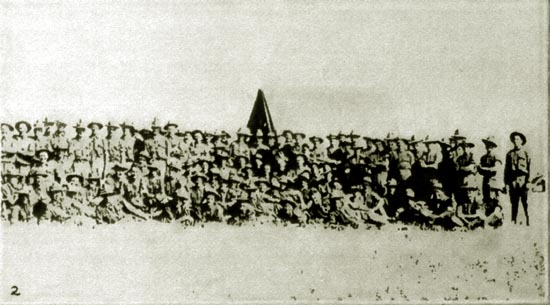
Wyoming National Guard, Ft. D. A. Russell, August, 1917.
The Town of Powell had planned a big formal leave-taking, but Captain Sawtell received the actual orders the same day the
train was to arrive. Fortunately, the town had held a big dance for the boys the night before at the Alpha Theater. The
proceeds of the dance together with.
Money raised by former Quarter master sergeant Baumgartner provided a "mess fund" for the boys. Not withstanding the short notice, over half of the
town turned out on the short notice to see the boys off.
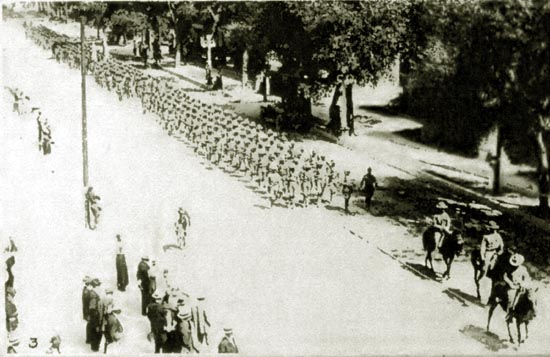
Wyoming National Guard, Cheyenne, August, 1917.
On September 2, Company C along with the rest of the units of the Wyoming National Guard departed Ft. D. A. Russell for
Camp Green, Charlotte, North Carolina, arriving on September 7, 1917.
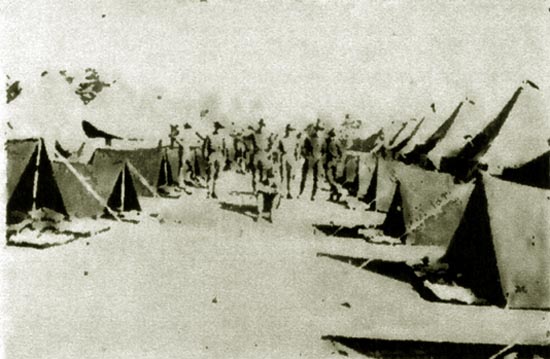
148th Field Artillery, Camp Greene, North Carolina, 1917.
Camp Green was none too comfotable. The camp was newly constructed and the men lived in tents. Board floors had not yet been
installed. Thus, the men had to sleep on the damp ground. Little drilling was done. Physcial fitness was accomplished through road marches.
At Camp Greene, Company C was made a part of the Field Artillery and became Battery "F" of the 148th Regiment of Field Artillery.
Notwithstanding the redesignation, the Powell Tribune for the duration continued to refer to
the boys as "Company C." Other units of the
Wyoming National Guard also became part of the 148th. Company B of the Wyoming Infantry was combined with Company B of the Oregon
Cavalry and the men distributed betwen Batteries D,E. and F. Company A, Wyoming Infantry with Troop "D" of the Oregon Cavalry became
Battery "D". A portion of Troop A of the Oregon Cavalry and the Headquarters Company, Wyoming Infantry became the Headquarters Company.
The balance were distributed to other batteries. Several Colorado units remained intact in their own batteries. Thus, men from the Big Horn Basin,
Bighorn Basin remained to a great extent together. The war cry "Powder River, Let'er Buck was adopted by the
148th, possibly following when an incident at Le Havre when some Crow Indians assigned to the
148th invaded a Battery C camp with the cry "Powder River."
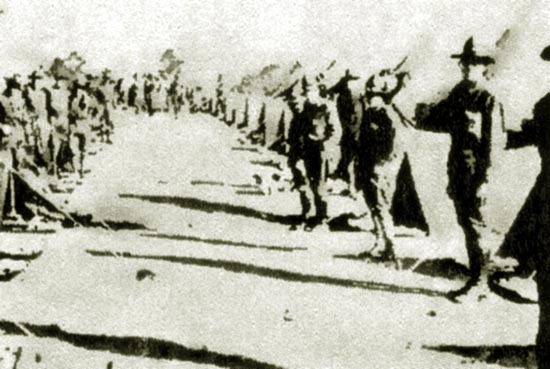
148th Field Artillery, Camp Greene, North Carolina, 1917.
In the meantime debate ensued in Powell over Christmas money for the boys from Powell. It was decided that money would
be sent to Capt.Sawtell for distribution to those from Powell. Other towns in the Basin would provide their own contributions to their
respective men. Where and when the boys would ship out was unknown in Powell. Wartime censorship forbade this information from being
provided to the families back in Powell.
In October, the men were shipped out to Camp Mills on the Hempstead Plains of Long Island.
Music this page courtesy Horse Creek Cowboy:
OVER THERE
VERSE 1:
John-nie, get your gun, get your gun, get your gun,
Take it on the run, on the run, on the run,
Hear them call-ing you and me, ev'-ry son of lib-er-ty
Hur-ry right a-way, no de-lay, go to-day
Make your Dad-dy glad to have had such a lad,
Tell your sweet-heart not to pine, to be proud her boy's in line
CHORUS:
O-ver there, o-ver there, send the word, send the word, o-ver there,
That the Yanks are com-ing, the Yanks are com-ing,
The drums rum-tum-ming ev'-ry where
So pre-pare, say a prayer, send the word, send the word to be-ware
We'll be o-ver, we're com-ing o-ver,
And we won't come back 'til it's o-ver O-ver There!
VERSE 2:
John-nie, get your gun, get your gun, get your gun,
John-nie show the Hun you're a son of a gun
Hoist the flag and let her fly, Yan-kee Doo-dle do or die
Pack your lit-tle kit, show your grit, do your bit
Yan-kees to the ranks from the towns and the tanks
Make your moth-er proud of you and the old Red White and Blue
CHORUS:
O-ver there, o-ver there, send the word, send the word, o-ver there,
That the Yanks are com-ing, the Yanks are com-ing,
The drums rum-tum-ming ev'-ry where
So pre-pare, say a prayer, send the word, send the word to be-ware
We'll be o-ver, we're com-ing o-ver,
And we won't come back 'til it's o-ver O-ver There!
Next page: "From Powder River to the Rhine."
|